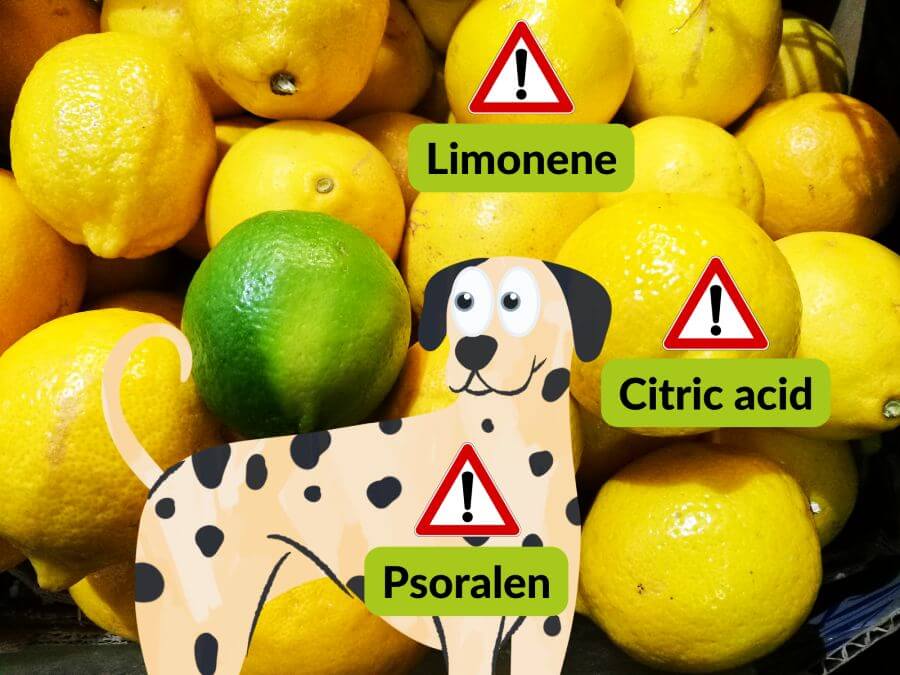Key Takeaways
- It’s important to set the record straight: dogs simply can’t munch on limes.
- The culprit behind this limey mischief is citric acid.
- In extreme cases, lime toxicity can take a toll on your dog’s liver or kidneys, causing significant damage. Yikes!
- If, by chance, you suspect that your furry companion has snuck a bite of a lime or any other citrus fruit, don’t delay—reach out to a vet immediately.
Does Vitamin C Make Limes Good for Dogs?
The main nutrient found in limes is ascorbic acid (vitamin C). It’s a water-soluble vitamin that is essential for the body’s overall health. Here are a few things it does:
- protects your cells against free radicals;
- promotes tissue growth and repair;
- improves skin condition via promoting collagen synthesis;
- supports the immune system.
Limes also contain other nutrients such as potassium, magnesium, and copper. These nutrients can help boost overall health and well-being. It’s also known that citrus fruits can help the liver heal from damage.
From this, it can be concluded that these fruit are high in nutritional value and provide many health benefits for people. But it’s not news that certain human food may turn out toxic or even fatal for pets. So, can dogs eat limes?
Fact 🔍
Dogs don’t need ascorbic acid in their food. Their bodies produce this vitamin for themselves, so supplementing it likely won’t do anything for your furry friend. The risks of the essential oils and acid, on the other hand, aren’t something to overlook!

Citric Acid and Other Compounds That Are Bad for Dogs
Fruits like limes and lemons contain citric acid. It’s a weak organic acid that is used as a food preservative and can also be found in products like toothpaste and mouthwash.
When ingested, citric acid can cause oral irritation, nausea, and vomiting in dogs. The amount of citric acid in limes and lemons is about 5%. It may not seem like a lot, but even this amount is too much for dogs to eat. The limonene present in citrus essential oils can make a dog sick, too, if eaten in large quantities.
Additionally, the peels contain psoralen, produced by the plants to protect them from insects. This is a potentially hepatotoxic substance (leading to liver failure). So if your dog eats the fruit directly from a lime tree, they may suffer more adverse effects than if they lick up a little juice.

Lime Poisoning in Dogs – Symptoms
Can dogs eat limes? It turns out that limes are toxic to dogs. Although they’re rich in vitamins and nutrients, citric acid is harmful to dogs. The acid and essential oils in limes can cause canines to have:
- oral inflammation;
- sensitivity to light;
- low blood pressure;
- lethargy;
- stomach upset;
- vomiting;
- diarrhea.
In severe cases, the acid can also cause liver and kidney damage, erode the tooth enamel and cause other dental problems. Lime poisoning in dogs can occur from eating just a slice of the fruit. Symptoms can develop within 30 minutes to 12 hours after ingestion. If you think your dog has eaten a citrus and shows any worrying symptoms, you should contact a veterinarian immediately.
Dogs Will Not Enjoy The Taste of Lemons and Limes

The sour taste of citrus is not favored by canines. It’s usually off-putting to them, so even if you happen to leave your dogs alone with limes, it’s unlikely that they’ll eat them. If your dog has a particularly big appetite, you should keep the limes away.
Conclusion: Can Dogs Eat Limes?
Can dogs eat limes? Oh, limey lime! It turns out our furry friends aren’t too keen on indulging in any part of your plant. From peels to leaves and that zesty fruit, dogs should steer clear. It’s like a sour symphony of tummy troubles waiting to happen! While there are some nutrients hiding in those limey delights, the citric acid, psoralen, and limonene can throw their stomachs into a real citrus circus. We wouldn’t want our pooches to go from tail-waggers to tummy-achers!
So, let’s leave the lime for our refreshing margaritas and keep our four-legged pals away from this zesty temptation. Woof, that’s a close shave!
Frequently Asked Questions
What Happens If a Dog Eats Lime? 🤔
If your mischievous pup decides to snack on a lime, keep a close eye out for some telltale signs of distress. Watch for symptoms like nausea, vomiting, diarrhea, sensitivity to light (let’s hope they don’t turn into little lime-shaped light bulbs!), and a noticeable lack of energy.
Can I Let My Dog Lick a Lime? 👅
If your mischievous pup decides to give it a little lick on the outside, no worries, it’s unlikely to cause any harm. But hold your leashes! If you catch your furry friend going all-out, slobbering and chewing on that zesty fruit like it’s the last treat on Earth, it’s time to intervene.
How Much Lime Juice Is Toxic to Dogs? ☠️
While it may seem harmless to us, even a tiny amount of that tangy goodness can be toxic to our four-legged pals. Talk about a sour surprise! So, let’s play it safe and keep our canine buddies far away from any human food that contains this potentially troublesome juice.
Similar Posts:
- Can Dogs Eat Lemons? Are Citrus Fruit Bad for Dogs?
- Can Dogs Eat Oranges? Best Citrus Fruit Tips for You and Your Dog
- Can Cats Eat Oranges? Are They Toxic?
- Can Dogs Eat Grapefruit? The Benefits and Risks
- Can Dogs Eat Peaches & Peach Pits? Tips for Dog Owners
- Can Cats Eat Fruit? What to Remember About Human Food
- Can Dogs Eat Tangerines? Everything You Need to Know!
- What Fruits Can Cats Eat? These Human Foods Are Safe for Cats

